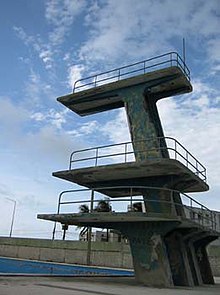Diving platform
A diving platform or diving tower is a type of structure used for competitive diving. It consists of a vertical rigid "tower" with one or more horizontal platforms extending out over a deep pool of water. In platform diving, the diver jumps from a high stationary surface. The height of the platforms – 10 metres (33 ft), 7.5 metres (25 ft) and 5 metres (16 ft) – gives the diver enough time to perform the acrobatic movements of a particular dive. There are additional platforms set at 3 metres (9.8 ft) and 1 metre (3.3 ft). Diving platforms for FINA sanctioned meets must be at least 6 metres (20 ft) long and 2 metres (6.6 ft) wide. Most platforms are covered by some sort of matting or non-slip surface to prevent athletes from slipping.

All three levels of the platform are used in JO and NCAA competition. Each level offers a distinct degree of difficulty (DD) and therefore could yield different scores for divers.[1]
Ten-meter diving
Diving began in the Olympics in 1904 for men, in what was called "fancy diving", which has been believed variously to have been off a platform or off a springboard.[2] The 10-meter dive began in the 1908 Olympics. Diving for women started in the 1912 Olympics for women, with the 10-meter dive.
In 2016, dives performed by competitors in 10-meter world competition included a 3-½ somersault tuck, a 3-½ somersault pike, a 2-½ somersault with 2½ twist, a forward 4-½ somersault, and a forward reverse 3½ somersault.[3][4]
References
- "FR 5 DIVING FACILITIES". FINA. 12 May 2010. Archived from the original on 1 August 2012. Retrieved 27 July 2012.
- "Diving at the 1904 St. Louis Summer Games". Olympics at Sports-Reference.com. Archived from the original on April 17, 2020. Retrieved August 1, 2019.
- David Woods (August 20, 2016). "David Boudia wins bronze in 10-meter platform diving". USA TODAY.
- Beth Harris (August 19, 2016). "Men's Diving: Britain's Daley Leads 10-Meter Platform". NBC Philadelphia.
External link
![]()